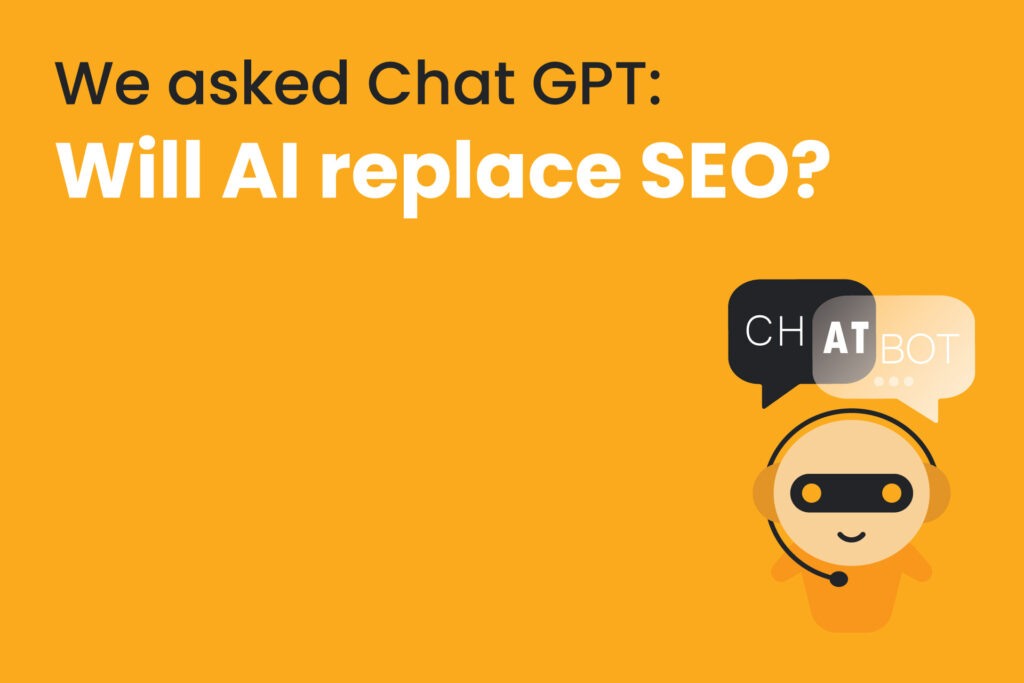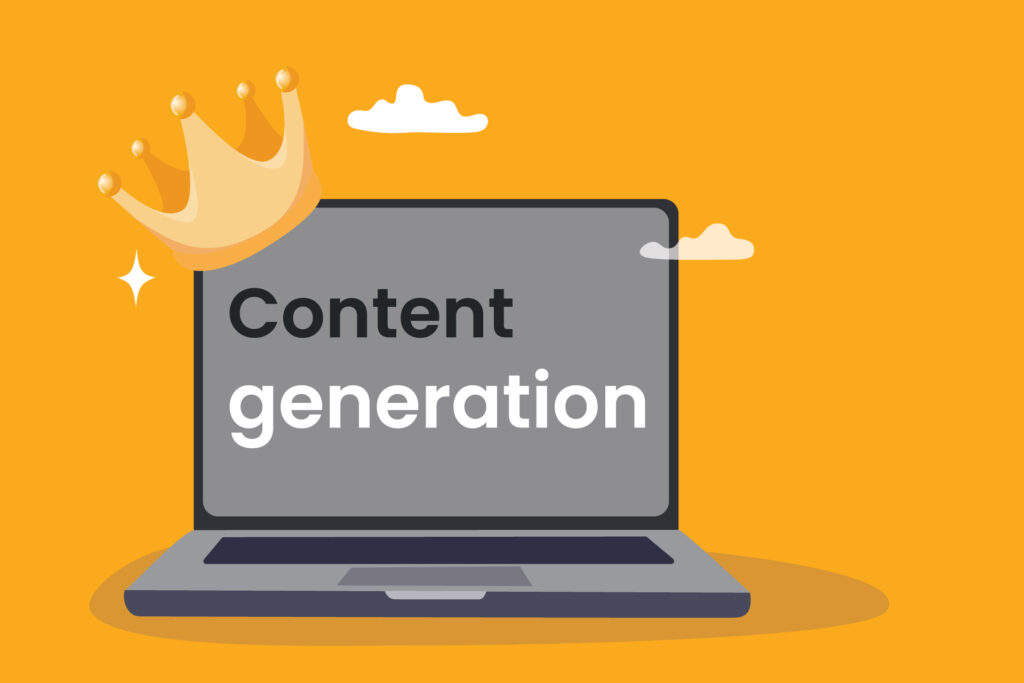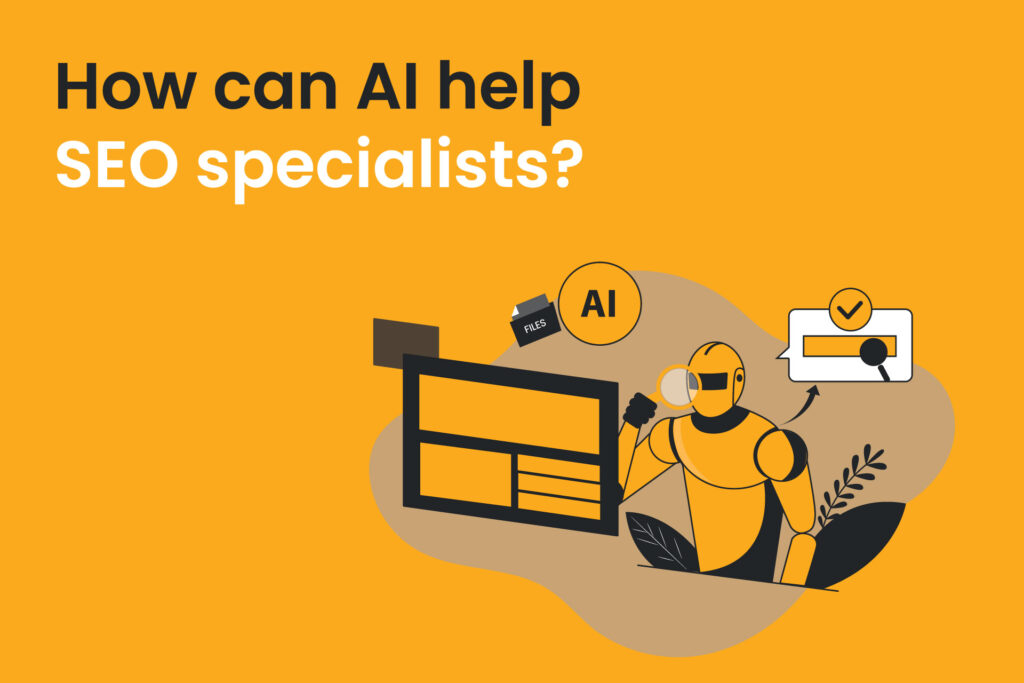Will we be at the mercy of robots to help us reach potential customers? Or will human insight continue to reign supreme as a means of optimizing search engine results pages (SERPs)?
As technology progresses, it’s natural to wonder if artificial intelligence may one day replace SEO experts.
With AI gradually making its way into nearly every field – from medicine to business – it raises an important question: What is the future of SEO with AI on the horizon?
In this blog post, we’ll explore how AI might affect SEO in the near and distant future, and what businesses can do in order to prepare for these changes.
So, let’s dive in!

The million-dollar question: Is AI taking over SEO?
The debate over artificial intelligence (AI) and its potential to take over Search Engine Optimization (SEO) is a hot topic among industry leaders.
The increasing use of AI in SEO has led some to believe that the technology may soon replace human expertise altogether.
However, seasoned SEO specialists can confidently say that AI is not taking over SEO, but rather augmenting it.
By leveraging machine learning and predictive analytics, AI can help us better understand user behavior and preferences, and create more personalized and relevant content strategies.
Ultimately, SEO is just one component of a larger digital marketing ecosystem, and embracing AI can help us achieve more comprehensive and effective campaigns.
Regardless of where one stands on the issue, it is clear that AI is already playing a significant role in SEO and is set to continue to do so in the future.
As such, it’s essential for businesses to stay informed about this developing technology and understand how it can be best utilized to enhance their SEO efforts.
But, Chat GPT also has its “opinion” too.
We asked Chat GPT: Will AI replace SEO?

According to Chat GPT:
“AI has the potential to automate certain aspects of search engine optimization (SEO) and provide valuable insights, but it is unlikely to replace SEO entirely. SEO involves human expertise in understanding user intent, creating quality content, and adapting to algorithm changes. While AI can assist in data analysis and recommendation, human involvement remains crucial in strategic thinking and decision-making. SEO will continue to require human input to effectively optimize websites and adapt to evolving search engine algorithms.”
How will AI impact search?
As we increasingly rely on technology to access information, it’s essential to understand the potential impact of Artificial Intelligence (AI) on search.
Recent advancements in AI aim to streamline search and provide more accurate results by enabling machines to understand and analyze complex data sets.

Here are some ways how AI is impacting search:
- Improved search results,
- Enhanced user experience,
- Personalization,
- Image and video search,
- Natural language processing,
- Content generation.
Improved search results
Thanks to AI algorithms, search engines are now able to provide users with more accurate and personalized search results.

These deep learning models analyze vast amounts of data, allowing them to understand user queries better than ever before.
By learning patterns, user preferences, and context, AI algorithms are able to deliver search results that are not only more relevant but also much more personalized.
Enhanced user experience
This is where AI-powered chatbots and virtual assistants come to the fore, providing real-time assistance that is both efficient and personalized.

With the ability to analyze user behavior and preferences, these chatbots and virtual assistants can tailor search experiences and provide recommendations that are perfectly suited to each individual.
They can even guide users through websites or applications, offering a seamless navigational experience both convenient and intuitive.
With the help of AI, user experiences can take on a whole new dimension of efficiency and personalization, making for a more engaging and satisfying online journey.
Personalization
One way AI is transforming search is by creating a more personalized experience for users.
By analyzing our search history and online behavior, AI algorithms are able to tailor search results to our individual interests and preferences.

This means we no longer have to sift through pages of irrelevant content or advertisements, as AI is able to deliver suggestions and recommendations that are uniquely relevant to each of us.
This type of personalization in search is just one example of how AI is changing the game when it comes to finding exactly what we’re looking for.
Image and video search
As search engines continue their evolution, artificial intelligence (AI) has found a critical role in enhancing search experiences.

One of the prime examples is the impact of AI on image and video searches. Thanks to AI-based computer vision algorithms, search engines are now able to analyze and comprehend visual content on a deeper level.
This breakthrough allows users to optimize their visual search for similar images, objects, or scenes, making their search efforts more accurate and efficient.
Related: SEO tips for visual search
Natural language processing
With AI’s help, search engines can now understand and interpret natural language queries, making search more conversational and user-friendly than ever before.

This means that rather than having to craft precise queries using specific keywords, users can now ask questions in a more natural, conversational way.
AI algorithms are also incredibly effective at processing spoken queries, making voice search a valuable tool for users on the go.
Content generation
One of the most significant ways AI impacts search is through content generation and curation.
With AI-powered tools at our disposal, we can now generate content such as news articles or product descriptions in seconds, based on data inputs and templates.

Moreover, AI algorithms can sift through vast amounts of information and recommend relevant content to users.
This has revolutionized the content creation process, ensuring that users receive the most relevant and tailored information possible.
How can AI help SEO specialists?
AI can be a game-changer for SEO specialists and open up countless possibilities to scale up their work.
With AI, SEO specialists can analyze critical data and insights about website traffic, user behavior, and conversion rates.
By utilizing this information, they can make informed decisions for better search engine ranking strategies.
Moreover, AI can help SEO specialists by automating complex tasks, reducing manual interventions, and enabling them to focus on creative and impactful actions.

AI can provide several valuable benefits and assistance to SEO specialists, such as:
- AI can process and analyze large volumes of data quickly, providing SEO specialists with valuable insights and optimization opportunities.
- AI-powered tools assist SEO specialists in identifying relevant keywords, suggesting placements, and improving search engine rankings.
- AI aids in content generation and optimization by providing topic suggestions, outlines, and recommendations for keyword usage and readability.
- AI tools analyze website elements to provide recommendations for proper structure, navigation, and optimization for search engine crawling.
- AI algorithms crawl websites to detect technical issues and provide recommendations for optimization, ensuring better search engine visibility.
- AI tools analyze search engine algorithm changes, offering insights and recommendations for adjusting SEO strategies to maintain or improve rankings.
What Chat GPT can do for SEO?
With the emergence of ChatGPT, SEO professionals now have a powerful new tool at their disposal.
ChatGPT is an AI language model that boasts lightning-fast speed and unparalleled intelligence.
But what sets it apart is its ability to mimic human-like responses, which makes it an ideal solution for optimizing your website’s search results.
There are several ChatGPT prompts for SEO to improve your online visibility, such as:
- Prompts for Keyword Research,
- Content Outline,
- Copywriting,
- Content improvement,
- Technical SEO,
- Creating titles,
- General SEO.
With its versatility and potential to transform the SEO landscape, Chat GPT is becoming an increasingly valuable asset for businesses of all sizes.
Related: Will AI replace software engineers?
To sum up
AI cannot completely replace traditional SEO techniques – for now, and likely into the future – but it can certainly help.
Understanding what resources are available to optimize a website’s performance is essential for staying ahead in the ever-advancing, ever-changing world of digital marketing.
By integrating AI into your SEO strategy, you can reduce manual labor and time spent on optimization while still providing dynamic and effective content.
In order to stay one step ahead, we must cast aside any fears of change and instead embrace these new technologies with open arms.





